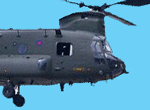This is a story of an ultimately happy but also bittersweet ending to a military helicopter crash investigation that has been going on for 17 years. Thanks in large part to the determined efforts of UK IT journalist Tony Collins and others like Solicitor Advocate Peter Watson, the two RAF pilots of a Royal Air Force Chinook Mk2 helicopter, Flight Lieutenant Jonathan Tapper and Flight Lieutenant Richard Cook, that crashed on the Mull of Kintyre were finally exonerated of blame for the accident.
The helicopter crash killed twenty-five intelligence and police officials and the crew of four on 2 June 1994. The flight took off at 1742 and crashed some 17 minutes later into the fog-shrouded Scottish mountain top. The crash was a mystery from the start. Both pilots were experienced, but had apparently flown their Chinook straight into the mountain. There were no emergency calls by the pilots of trouble, and the examination of the wreckage didn't point to any overt mechanical problem. The helo also did not carry a black box that could have shed some light on potential causes of the crash either.
An official RAF inquiry in 1995 found that "there were many potential causes of the accident... but... the board was unable to determine a definite cause." As this Independent story from 1995 states:
"The original board of inquiry, headed by Wing Commander A D Pulford, concluded that although it was likely the craft's pilot, Flight Lieutenant Jonathan Tapper, made an error of judgement in an attempt to climb over the Mull of Kintyre, 'it would be incorrect to criticise him for human failings based on the available evidence.' "
However, Air Vice-Marshal Sir John Romney Day, Reviewing Officer of the Board of Inquiry, with the concurrence of Air Officer Commanding-in-Chief Sir William Wratten, Senior Reviewing Officer of the Board of Inquiry, dissented from the board's findings, saying that:
"Flt Lt Tapper did not exercise appropriate care and judgement. He allowed his aircraft to proceed at both high speed and low level directly towards the Mull, notwithstanding the obvious dangers of such an undertaking. I am forced to conclude that he was negligent to a gross degree."
Vice-Marshal Day also concluded that Flt Lt Cook should have recognized the dangers and was therefore negligent to a gross degree as well.
This highly controversial finding sparked the long and twisted process by the families of the pilots and their supporters to clear their names. The tale - replete with multiple inquiries that challenged the RAF's ultimate findings and which were always summarily dismissed as irrelevant by the MoD and senior RAF officers - is too long and tortuous to review in detail, but you can read stories about the crash, the inquiries and their aftermath at Tony Collins' archive here.
There is also a story published in 1997 by the Independent that provides I believe the first real public inkling that there was likely something wrong with the Chinook's Full Authority Digital Engine Control (FADEC) software that the pilots were not fully aware of. Another story by the Guardian in 1999 provides more details into the crash and its possible causes. Further, there is a story from the BBC in 2010 that reviews the contention that software might have been factor in the crash, as well as some background about the various inquiries that have taken place and MoD's view (still held by many) that Vice-Marshall Day was correct in his conclusions. And finally, the London Telegraph gives a recent timeline of the 17 years of official inquiries here.
With the change in the UK government last year, another inquiry into the crash was convened by MoD Secretary Liam Fox in June of last year. The review was led by retired judge Lord Alexander Philip who as assisted by three Privy Counsellors. As described at the MoD web site:
"The review makes three key recommendations:
- the finding that the pilots were negligent to a gross degree should be set aside
- MoD should consider offering an apology to the families of the pilots
- MoD should reconsider its policy and procedures for the transport of personnel whose responsibilities are vital to national security."
Furthermore,
"At the request of the Defence Secretary, the Defence Council was convened and has set aside the findings that the pilots were negligent to a gross degree and has ordered that this action be noted on the pilots' records."
"On behalf of the MOD, the Defence Secretary has also apologised to the families of the pilots."
However, Lord Philip's review indicates that the cause(s) of the crash will likely remain a mystery. So why did two experienced special forces pilots - Flt Lt Tapper had a total of 3,165 military flying hours while Flt Lt Cook had 2,867 hours - crash that early evening on a relatively routine flight?
Theories abound, but at least for the families of the dead pilots, some closure is at hand.
Robert N. Charette is a Contributing Editor to IEEE Spectrum and an acknowledged international authority on information technology and systems risk management. A self-described “risk ecologist,” he is interested in the intersections of business, political, technological, and societal risks. Charette is an award-winning author of multiple books and numerous articles on the subjects of risk management, project and program management, innovation, and entrepreneurship. A Life Senior Member of the IEEE, Charette was a recipient of the IEEE Computer Society’s Golden Core Award in 2008.



